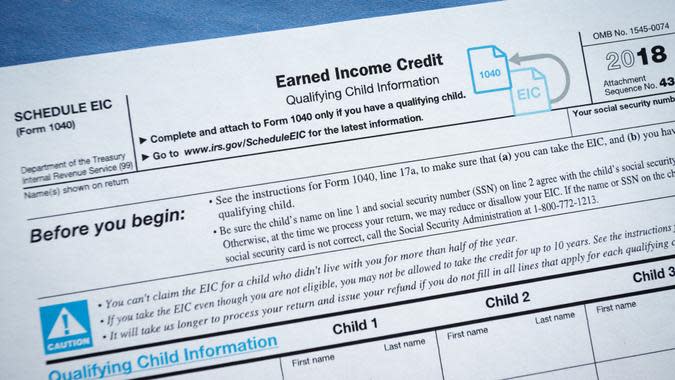29 Ways To Prevent a Tax Audit

There are few words in the English language more likely to produce an involuntary wince than “audit.” If your tax return is audited, you may need to pay a tax bill or tax penalties depending on what the IRS uncovers during said audit.
However, the good news is audits are extremely rare. Once you’re aware of IRS audit triggers, you can steer clear of making any potential red flags that could result in tax collector scrutiny.
Read on to find out how you can avoid an IRS audit as you prepare your taxes.
Read More: This Is the One Type of Debt That ‘Terrifies’ Dave Ramsey
Check Out: Owe Money to the IRS? Most People Don’t Realize They Should Do This One Thing

1. Enter Your Information Correctly
Although it sounds obvious, make sure you do the simple things correctly. Making a mistake when you enter your Social Security number or misspelling your name can result in the IRS rejecting your return or worse, experiencing an audit.
If you make this kind of mistake you’ll have to refile, which will delay how quickly you receive a refund.
See More: Top 7 Countries With Zero Income Tax
Be Aware: IRS Increases Gift and Estate Tax Exempt Limits — Here’s How Much You Can Give Without Paying
Sponsored: Owe the IRS $10K or more? Schedule a FREE consultation to see if you qualify for tax relief.

2. Provide Accurate Numbers
The income amounts you enter on your return must match the information the IRS receives through W-2 and 1099 forms. If they don’t, you’re asking for trouble.
“The IRS computers cross-check the information reported to them on your tax return with the information that is received from businesses filing informational returns,” said Crystal Stranger, enrolled agent, at Optic Tax. “If this information is not a match, you are nearly guaranteed to receive a computer-generated audit letter.”
Read Next: Trump-Era Tax Cuts Are Expiring — How Changes Will Impact Retirees

3. Report All Income
You need to report the earnings on your tax return if you make any money outside of your regular job, said David M. Hryck, a partner at Holland & Knight LLP.
“If the person or company that is paying you reports the business, you would definitely be raising a red flag,” he said. For example, if you do freelance photography for a company that reports your payment as a business expense, the IRS expects to see the same amount listed as income on your return.

4. Avoid Claiming Too Many Deductions
The IRS selects some returns for audit based on how different your return is from the statistical norms for similar tax returns. If you are entitled to a deduction, you should claim it. But be prepared to back it up if the IRS inquires.
Find Out: Billionaires vs. the Middle Class: Who Pays More in Taxes?

5. Minimize Year-to-Year Differences
The IRS identifies returns to audit based on comparisons with your tax returns from previous years.
“If there is a large differential of an amount from one year to another, it would increase your chances of being examined,” said Craig Smalley, an enrolled agent and founder and CEO of CWSEAPA, an accounting and financial services firm with offices in Delaware, Florida and Nevada. For example, your risk of an IRS audit might rise if you claim $2,000 of mortgage interest one year and $25,000 the next.

6. Report All Foreign Income
You must report all income on your U.S. tax return, regardless of where you earned it.
“People need to understand that just because they’re saving or earning money outside of the U.S., it does not mean the money is free money,” Hryck said. Fail to declare this cash and not only are you at risk of an audit, you might be guilty of a crime if you are hiding offshore income.
Trending Now: The 7 Worst Things You Can Do If You Owe the IRS

7. Avoid Claiming Excessive Mileage Deductions
The IRS will compare the number of business miles you claim with what is standard in your occupation, said Dave Du Val, Vice President of Customer Advocacy at TaxAudit.com.
“We see a lot of returns that report thousands of miles driven for business, but they have an occupation listed that doesn’t typically require travel,” he said. “And when you think it through, their reporting would have them driving all day every day of the year — which of course doesn’t make sense.”

8. Claim the American Opportunity Credit Only If You Qualify
The American Opportunity Tax Credit offers money back on your taxes for higher education costs.
Taxpayers can claim it for up to four years of higher education as long as you’re seeking a degree or other recognized credential, enrolled at least half-time and meet other requirements.
This credit, however, is receiving additional IRS scrutiny, Smalley said. Don’t claim it unless you’re entitled to it.
For You: Taxes on Generational Wealth Just Changed: Here’s What You Should Know

9. Don’t Falsely Claim Dependents
Each dependent you claim lowers your taxable income. But you cannot claim dependents on your return if they are being claimed on another return.
“One of the more simple mistakes includes claiming an exemption for a dependent on a parent’s tax return, where the same exemption is unwittingly claimed on the dependent’s separate tax filing, or where the same exemption for a dependent is claimed by both married persons filing separately,” said Nathan Smith, a director at the CBIZ National Tax Office.

10. Be Conservative With Deductions If You Earn a High Income
Making more money during the year increases your IRS audit risk, said Smith. “Tax returns that report more than $200,000 of income are audited more frequently than those below that threshold,” he said.
Tax audit activity is even higher for returns reporting income in excess of $1 million, according to Smith.
View More: 10 Items From the 1980s That Are Worth a Lot of Money

11. Report Your Foreign Accounts
Having a foreign account is not illegal — you might work or live abroad. You must, however, file Form 8939 if your foreign financial assets exceed the thresholds for your filing status.
For the 2023 tax year, single U.S. residents must file Form 8939 if their foreign assets exceed $75,000 at any time during the tax year or $50,000 as of the end of the tax year. If you file jointly, those thresholds are doubled.

12. Avoid Early Retirement Withdrawals
If you make an early withdrawal from a retirement plan, like a 401(k) or IRA, it can trigger heightened scrutiny of your return, according to Hryck.
“Typically, the IRS is under the assumption that people who are withdrawing early tend to make mistakes on their tax returns,” he said.
Discover More: 9 Most Valuable American Quarters in Circulation

13. Don’t Claim the Earned Income Tax Credit Unless You Qualify
The earned income tax credit (EITC) may be used to increase your refund or reduce taxes owed by taxpayers. Be sure to review the eligibility requirements to see if you qualify for the EITC.

14. Don’t Claim Political Contributions as Charitable Contributions
Although you might think you’re doing your part by making contributions to your favorite politician, you aren’t allowed to include those amounts as part of your charitable contributions deduction.
“The IRS is more than likely to review returns claiming large charitable contributions, as political donations are not tax deductible,” said James Oliveri, registered tax return preparer and owner of NYCTaxguys.
That’s Interesting: 10 Best Cheap Gym Memberships: Break a Sweat but Not Your Budget

15. Keep Your Business and Personal Accounts Separate
If you own a business, don’t use the company accounts as your personal piggy bank.
“Be careful how you categorize monies being put into your business and monies being taken from your business,” said Oliveri. “The IRS could come back and classify some of the money taken as a taxable event.”
If you have a sizable business, it might be worth preparing an internal audit report to make sure you’re deducting all your expenses and nothing more.

16. Choose a Reputable Tax Preparer
The IRS has instituted an oversight program to flag returns prepared by tax preparers who have been criminally charged for tax fraud. It has also had unqualified tax preparers on its list of tax scams since 2015. Choose carefully if you are a taxpayer who uses a tax preparer.
Explore Next: 10 of the Most Valuable Pennies

17. Don’t Claim the Child Tax Credit If You Don’t Qualify
If you have a qualifying child, you may be able to receive a tax break by claiming the child tax credit.
Qualifying children include your own children, eligible foster children, siblings or descendants of one of these. They must be under age 17 at the end of the year and can’t provide more than half of their own financial support.
The IRS watches the child tax credit closely. If you know you’re eligible, don’t let that deter you from claiming it. Just make sure you enter all your information correctly.

18. Report All Investment Income
Your income includes wages as well as gains from stocks, bonds and interest. If you’re in a rush to get a refund, you might accidentally forget about those types of income.
“I had a client who had stock sales of $50,000,” said Oliveri. “She never reported it on her return and, lo and behold, the IRS wants $10,000 in taxes.”
Try This: Lincoln Pennies With Dime Reverse Sides Are So Rare They’ll Fetch Upward of $100K

19. Reconcile Health Insurance Premium Tax Credit Advances
If you got an advance payment on your health insurance premium tax credit, you must do extra work to make sure you were eligible to receive it.
“Taxpayers receiving such advance payments must reconcile them on Form 8962 to determine ultimate eligibility for the credits, which are reported to the taxpayer on Form 1095-A,” said Smith.

20. Don’t Claim To Be a Real Estate Agent To Get a Tax Break
If you have rental properties that generate a tax loss, you usually can’t use the loss to offset other income because the IRS classifies the event as a “passive activity loss.” Instead, you must carry the loss forward until you get rid of the property or have taxable gains.
If you do participate in the real estate management you can take the loss that year. Some people falsely claim to be real estate agents so they can claim such a loss.
Typically, material participation requires working in the business for more than 500 hours. Du Val said the IRS looks closely at taxpayers who claim “real estate professional” status to avoid the passive activity loss limitation.
Be Aware: You Can Get These 3 Debts Canceled Forever

21. Consult With a Qualified Tax Preparer
The tax code can be difficult to read and understand, so consider consulting with a tax professional. And don’t look for a cheap tax preparer just so you can save money. Some return preparers are actually scammers who will steal your refund or identity, according to the IRS.

22. Don’t Make Frivolous Tax Arguments
You’ve probably heard of people who claim they are exempt from paying taxes because they are sovereign citizens. Other people say paying taxes is really just optional.
The IRS and the U.S. Tax Court have found these and other similar arguments to be frivolous. The IRS warns taxpayers that the penalty for filing a fraudulent return is $10,000 — and that it can audit a fraudulently filed return at any time in the future.
Explore More: How Much Is Spotify Premium and Can You Get a Discount?

23. Get Receipts for Charitable Cash Contributions
The IRS can disallow a charitable deduction if you don’t have proof of the donation. If you gave less than $250 you can use a canceled check, credit card statement or bank statement as proof. If you gave $250 or more you need a written statement from the charity with information including:
How much you gave
What, if anything, you received in return for your contribution
The value of what you received

24. Document Charitable Goods Donations
If you donate goods to a charity, you’re eligible to deduct the fair market value if you have the right documentation. If you don’t have that documentation, the IRS can disallow your deduction.
If you gave less than $250, you need a receipt that shows the name of the charity, the date and the charity’s location and a reasonably detailed description of what you gave. If you dropped off the goods at an unmanned location — such as putting clothes in a charity’s drop box — you can claim the deduction without a receipt. If you gave more than $250 worth of goods, you always need a receipt.
Discover Next: 4 Debts That Are Not Discharged in Bankruptcy

25. Maintain Records for Employee Expenses
Employee expenses are targets for IRS inquiries.
If you’re claiming the deduction, Stranger said you must have your company’s reimbursement policy in writing. To deduct expenses you paid for your job, have proof that your company’s policy is not to reimburse you for those expenses and that it did not — and that incurring the expenses was required for you to do your job, she said.

26. Keep a Trip Log for Car-Related Deductions
If you claim car-related deductions — like business or charity mileage expenses — keep written proof of your business and total mileage for the year.
Log this information in a book or keep it in a smartphone app that creates a professional record of auto expenses.
That’s Interesting: 7 Key Signs You’ve Reached Financial Freedom

27. Substantiate HSA Distributions With Receipts
A health savings account allows you to put pre-tax dollars into the account, then take out the money tax-free as long as you spend it on qualified medical costs.
You aren’t required to include your receipts for the medical expenses when you file your return, but you must keep them in case you are audited.

28. Substantiate Why Your Costs Qualify
Document why the costs listed on receipts qualify for particular deductions if you are trying to claim them.
For example, if you have a receipt for plane tickets to Hawaii you will need additional information to support the business purpose. If all you have are plane tickets when the IRS audits your return, you’re going to have a hard time proving your deduction was legitimate.
Learn More: How Much Money Do Americans Have in Their Bank Accounts in 2024?

29. Maintain Records Until the IRS Can’t Challenge Anymore
The IRS typically has three years to audit your return. There are, however, certain times the tax audit limit period can be extended.
For example, if you underreport your income by more than 25% the IRS has six years to audit you. If you have unfiled tax returns, or you file a fraudulent return, the IRS can audit your taxes for that year at any time in the future.
Joel Anderson and Heather Taylor contributed to the reporting for this article.
More From GOBankingRates
I'm a Shopping Expert: 9 Items I'd Never Put in My Grocery Cart
Avoid This Simple Banking Mistake That Could Cost You Over $1,000
6 Things You Should Never Do With Your Tax Refund (Do This Instead)
This article originally appeared on GOBankingRates.com: 29 Ways To Prevent a Tax Audit
